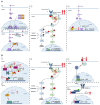Novel Treatment Strategies for Hormone Receptor (HR)-Positive, HER2-Negative Metastatic Breast Cancer
- PMID: 38930141
- PMCID: PMC11204965
- DOI: 10.3390/jcm13123611
Novel Treatment Strategies for Hormone Receptor (HR)-Positive, HER2-Negative Metastatic Breast Cancer
Abstract
Estrogen receptor (ER)-positive breast cancer (BC) is the most common BC subtype. Endocrine therapy (ET) targeting ER signaling still remains the mainstay treatment option for hormone receptor (HR)-positive BC either in the early or in advanced setting, including different strategies, such as the suppression of estrogen production or directly blocking the ER pathway through SERMs-selective estrogen receptor modulators-or SERDs-selective estrogen receptor degraders. Nevertheless, the development of de novo or acquired endocrine resistance still remains challenging for oncologists. The use of novel ET combined with targeted drugs, such as cyclin-dependent kinase 4 and 6 (CDK4/6) inhibitors, has significantly improved long-term outcome rates, thus changing the therapeutic algorithm for metastatic BC (MBC) and recently the therapeutic strategy in the adjuvant setting for early high-risk BC. Eluding the resistance to CDK4/6 inhibitors combined with ET is currently an unmet medical need, and there is disagreement concerning the best course of action for patients who continue to progress after this combination approach. Genetic changes in the tumor along its growth uncovered by genomic profiling of recurrent and/or metastatic lesions through tumor and/or liquid biopsies may predict the response or resistance to specific agents, suggesting the best therapeutic strategy for each patient by targeting the altered ER-dependent pathway (novel oral SERDs and a new generation of anti-estrogen agents) or alternative ER-independent signaling pathways such as PI3K/AKT/mTOR or tyrosine kinase receptors (HER2 mutations or HER2 low status) or by inhibiting pathways weakened through germline BRCA1/2 mutations. These agents are being investigated as single molecules and in combination with other target therapies, offering promising weapons to overcome or avoid treatment failure and propose increasingly more personalized treatment approaches. This review presents novel insights into ET and other targeted therapies for managing metastatic HR+/HER2- BC by exploring potential strategies based on clinical evidence and genomic profiling following the failure of the CDK4/6i and ET combination.
Keywords: CDK4/6 inhibitors; endocrine therapy; hormone-positive HER2-negative breast cancer; next-generation endocrine agents; resistance mechanisms to ET and/or CDK4/6i; targeted therapies.
Conflict of interest statement
The authors declare no conflict of interest.
Figures



References
-
- Allison K.H., Hammond M.E.H., Dowsett M., McKernin S.E., Carey L.A., Fitzgibbons P.L., Hayes D.F., Lakhani S.R., Chavez-MacGregor M., Perlmutter J., et al. Estrogen and Progesterone Receptor Testing in Breast Cancer: ASCO/CAP Guideline Update. J. Clin. Oncol. 2020;38:1346–1366. doi: 10.1200/JCO.19.02309. - DOI - PubMed
-
- Hortobagyi G.N., Stemmer S.M., Burris H.A., Yap Y.S., Sonke G.S., Paluch-Shimon S., Campone M., Petrakova K., Blackwell K.L., Winer E.P., et al. Updated results from MONALEESA-2, a phase III trial of first-line ribociclib plus letrozole versus placebo plus letrozole in hormone receptor-positive, HER2-negative advanced breast cancer. Ann. Oncol. 2018;29:1541–1547. doi: 10.1093/annonc/mdy155. - DOI - PubMed
Publication types
LinkOut - more resources
Full Text Sources
Research Materials
Miscellaneous

